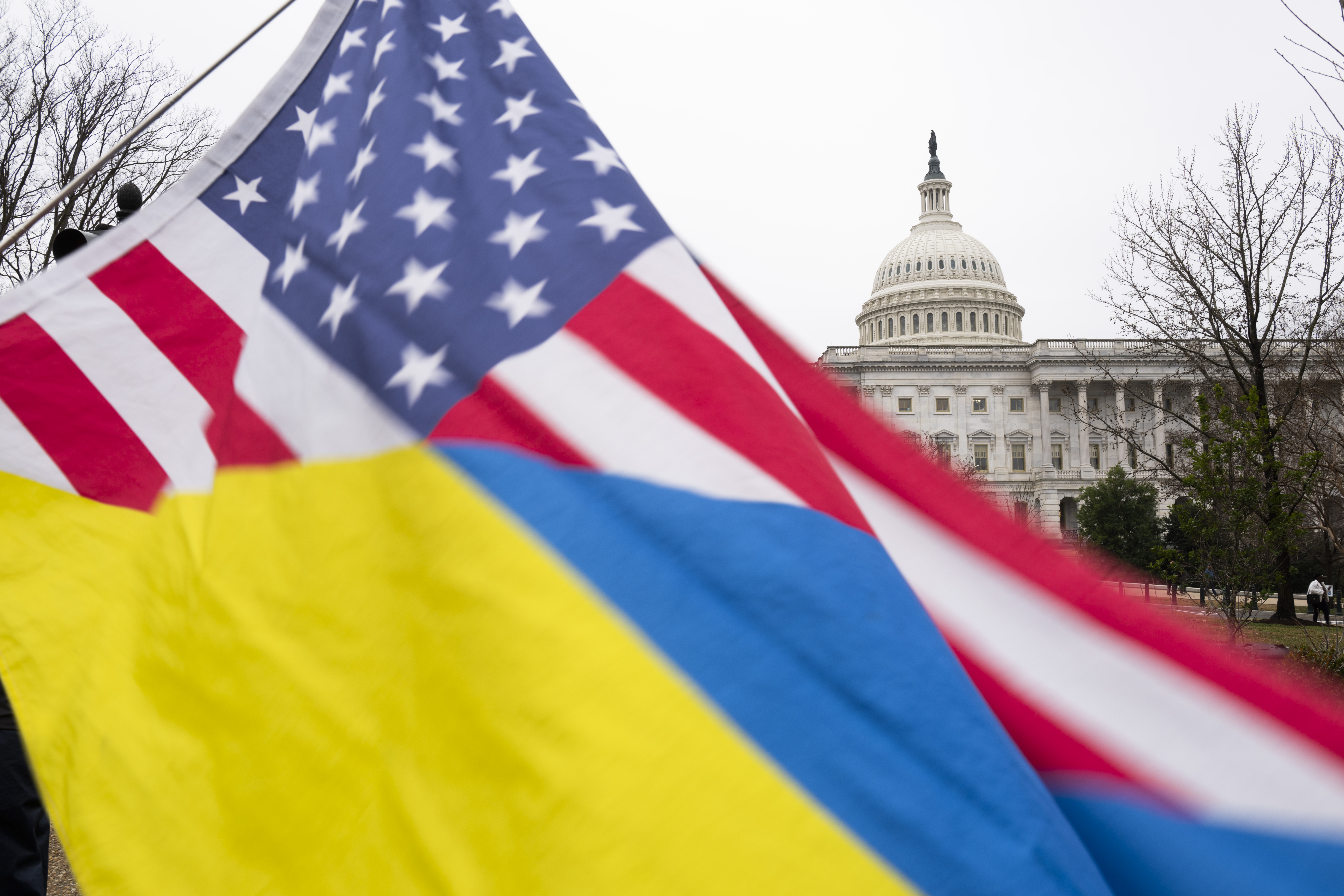Putin Believes the U.S. Lacks Strength. Trump Can Prove Otherwise.
"Don't make a bad deal to end the war." This article delves into the complexities and dilemmas surrounding peace negotiations in conflict zones. It emphasizes the importance of ensuring that the terms of any agreement are just and sustainable, rather than rushing into a resolution that could lead to further instability. Through analysis and expert insights, the piece explores the potential consequences of poorly conceived deals and advocates for a thoughtful approach to diplomacy that prioritizes long-term peace over short-term solutions.

Having served in senior foreign policy roles during Republican administrations, we believe that Trump's stated objectives—particularly his philosophy of "peace through strength"—can be better achieved by maintaining robust support for Ukraine and standing firm against Putin. The pro-Ukraine faction in his new administration has an opportunity to persuade him of this, provided they present a compelling case.
If we were advising Trump on Ukraine, our argument would begin with the observation that his return to the White House coincides with increasing calls for negotiations with Moscow to end the conflict. This perspective stems from a belief that the situation on the battlefield has worsened and that Ukrainian morale is flagging due to war fatigue, along with fatigue from their Western backers.
However, the readiness of some in the United States to abandon Ukraine does not imply that it is the right course of action. On the contrary, such a move would not bring an end to the war; it would instead create an even greater threat to the United States in the shape of a stronger Putin-led Russia.
Since your election, Putin has disregarded your reported request to refrain from escalating the conflict. He has instead continued with military aggressions, including launching an intermediate-range ballistic missile that appears to violate previous treaties from which you have rightly withdrawn. He intensifies attacks on Ukrainian civilians and infrastructure, showing a clear lack of willingness for any genuine negotiation that would allow Ukraine to retain its sovereignty and aspirations for NATO membership.
Such a proposed deal would represent a significant misstep for your administration. Even initiating negotiations on these terms could precipitate a Ukrainian collapse that marred the early days of your presidency.
Additionally, such a settlement would convey a message of weakness, which Putin would undoubtedly exploit. This perception could embolden Chinese aspirations regarding Taiwan and suggest to Iranian leaders that the U.S. is withdrawing from global commitments, potentially leading to escalated tensions with Israel. In summary, capitulating to Putin over Ukraine risks creating widespread instability and could even spark a larger conflict, possibly leading to World War III.
The more prudent approach is to confront Putin and support Ukraine in achieving victory against Russian forces. Assisting Ukraine is not only morally justified but would also enhance U.S. national security, signal a clear stance to adversaries, and strengthen your presidency and the United States' reputation worldwide.
Putin initiated this conflict and could decide to end it as well. He mistakenly believes he can conquer Ukraine, replace its leadership, and occupy significant territories, all while outlasting Western resolve. This is your moment to prove him wrong.
No one desires peace more than Ukrainians, who continue to endure Putin’s barbaric onslaught. The numerous human rights violations committed against children, surrendering soldiers, and ordinary citizens have only intensified their resolve to attain victory. It is crucial not to coerce them into a disadvantageous agreement with Putin.
Acknowledging the frustrations of Ukrainians regarding the Biden administration's sluggish responses to their requests for weapons, there is a unique opening for you to expedite these processes. Your election represents a chance to rectify the shortcomings of the previous administration by hastening the delivery of the arms Ukraine requires for its defense.
Due to delays from Biden, Ukrainians have had to fight under severely restricted conditions. However, their development of drone technology has delivered significant strikes against Russian forces, proving their capacity to hit strategic targets within Russia. Just imagine the potential outcomes if timely assistance had been provided. Consider how much weaker Russia might be without support from hostile nations like Iran, North Korea, and China. By empowering Ukraine with the necessary support, you can unleash their full potential in this fight.
Furthermore, dismiss any concerns regarding Putin's threats of nuclear engagement. Ukraine and its Western allies have already surpassed numerous purported "red lines"—including Ukraine's operations in Russian territory—thus diminishing the deterrent effect of these threats.
Despite being outnumbered and facing the deployment of over 10,000 North Korean soldiers, Ukraine has significantly impacted Russia’s military capabilities, reclaiming over half of the territory lost during the initial phase of the invasion. Russia has lost an alarming number of personnel, with estimates exceeding 700,000 dead and wounded.
While Russian troops are making gradual advances in parts of the Donbas, they do so at a tremendous cost. Recent months have reportedly been some of the bloodiest for Russian forces, indicating a troubling shift in the conflict. The enlistment of North Korean soldiers reflects both the escalation of the war and Putin's desperation, as he faces an insufficient number of troops to secure a complete victory without risking domestic unrest.
Currently, Putin is at a critical juncture. The financial toll of the ongoing war is mounting. Reports indicate that the Russian government has dramatically reduced compensation payments to soldiers and that inflation and interest rates are soaring, creating economic instability that the Kremlin can ill-afford in the context of a protracted conflict.
Abruptly terminating U.S. military support for Ukraine and hastily pursuing negotiations would not yield a sustainable resolution. Despite Kremlin insiders suggesting possible openness to negotiations, recent statements from spokesperson Dmitri Peskov indicate that merely freezing the conflict along current lines will not suffice for Putin. He is attempting to project strength, but the reality is otherwise.
Moreover, an imposed solution on Ukraine would create significant risks for the United States in other global arenas. It might render Taiwan more susceptible to Chinese aggression, suggesting to President Xi Jinping that he could advance his own territorial ambitions without consequence. Such a dynamic would signal an American retreat from international commitments and reinforce perceptions—similar to those following Biden's problematic withdrawal from Afghanistan—that the United States is an unreliable ally.
You have the opportunity to outperform the soon-to-be outgoing administration.
Don’t be misled by concerns surrounding Ukraine’s NATO membership. While bringing Ukraine into NATO would pose complexities, rejecting this possibility would project weakness, effectively granting Putin a veto over NATO's future expansion and eliminating a key deterrent against further Russian aggression.
If Ukrainians choose to negotiate with their aggressors, it should be their decision alone. Forcing them into negotiations could sap morale among Ukrainian fighters and undermine the leverage both you and Ukraine would possess in future discussions.
Finally, supporting a Ukrainian victory would also position the U.S. to refocus its strategic attention on China. It would affirm America’s global leadership and demonstrate that a strategy of “peace through strength” is indeed viable.
You have a remarkable opportunity to utilize your second term to restore American strength and global leadership by aiding Ukraine in achieving victory and ensuring that Putin's defiance and aggression do not go unanswered.
Emily Johnson contributed to this report for TROIB News
Discover more Science and Technology news updates in TROIB Sci-Tech












